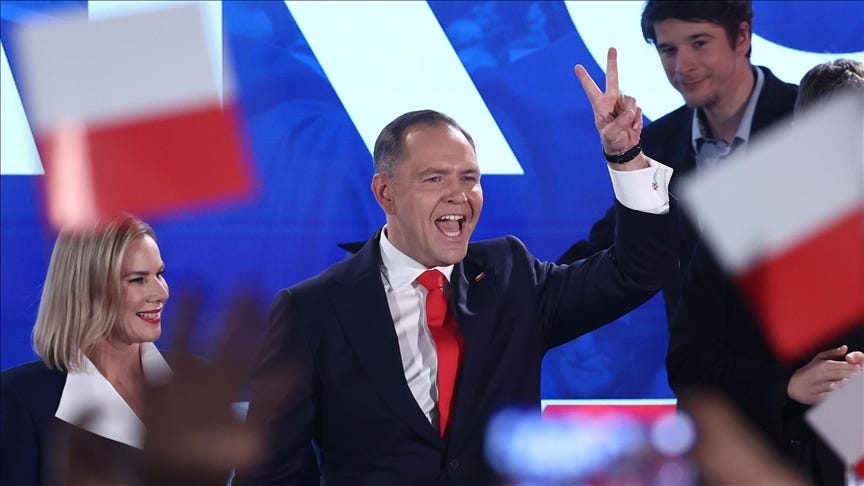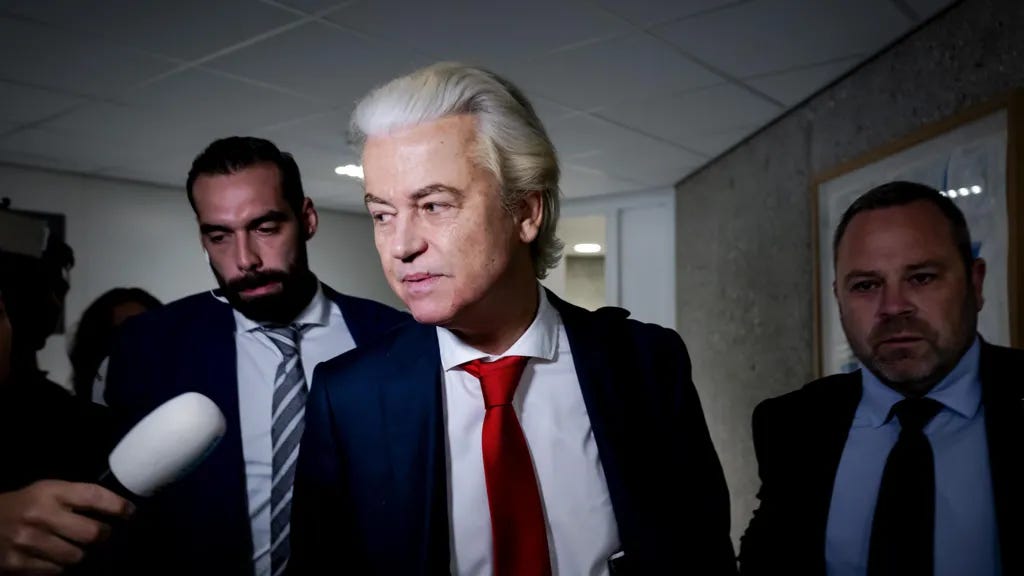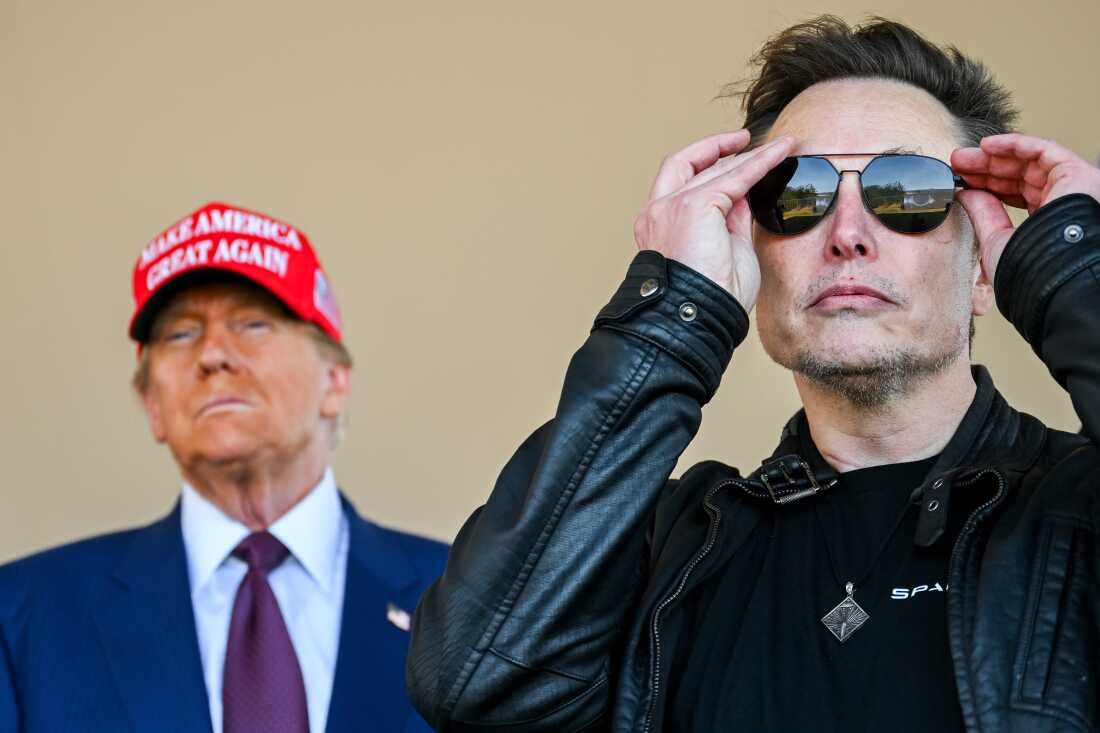Weekly Journal - 07.06.25
A collection of my thoughts on this week in the news
“There are decades where nothing happens; and there are weeks where decades happen”. I don’t think this quote has resonated with me so much until now. It feels like so much happened this week, following months of ‘nothing ever happening’.
Poland Shifts Right
Last Sunday, MAGA won in Poland. Maybe not directly, but it definitely won a symbolic victory. After voters rejected Trumpist candidates in recent elections in Canada, Australia and Romania - enough to suggest that an international anti-Trump wave was starting to build momentum and halt the populist surge - Polish voters went the other way. They elected Mr Nawrocki, a conservative historian and former boxer with a taste for chauvinistic qualities, rejecting Rafal Trzaskowski, the liberal mayor of Warsaw, in what became the closest fought election race in modern Polish history. The country has never been more polarised than it is now, with the final election results being an almost perfect 50-50 split. Just two short years after delivering Donald Tusk, the former President of the EU commission, a strong liberal mandate, Poland has once again swung right. Like the US election of 2024, it was another bruising reminder of how populism remains resilient and sticky and that liberals have yet to find a reliable formula to defeat it.
For Polish liberals, everything was on the line. While Mr Tusk’s centrist coalition had defeated the nationalist Law and Justice Party in 2023’s parliamentary elections, it won a small majority in the lower parliament, made worse by the need to juggle several factions at odds with each other in a fragile alliance of social democrats, social conservatives, economic and social liberals, and centrists.. Given the coalition’s wide-ranging ideological divisions, it has meant that Mr. Tusk has spent more time juggling several contentious issues to satisfy his coalition partners rather than making any progress on his reforming crusade. Plans to legalise abortion, recognise same-sex civil unions and wrestle control of the institutions from PiS’ loyalists have been put on the backburner while the government has prioritized issues that all members agree on, which, in such an increasingly polarising political climate, gets fewer with each passing day. The one adhesive holding them together, opposition to PiS, now finds itself weakened by the respectable performance of the party’s presidential candidate, effectively a referendum on their term in office. The outcome is a resounding rejection of the Tusk mandate.
Nawrocki, inevitably, has been painted by European media as an existential danger, the figurehead of a nationalist wave sweeping the continent. These concerns are not entirely baseless — Donald Trump blessed Nawrocki in the Oval Office in early May; his Secretary of Homeland Security, Kristi Noem, travelled to Poland and endorsed him — but they are perhaps exaggerated. Nawrocki is not a fascist, nor is he an aberration. He is a product of a specific moment in Polish politics, which are riven by competing ideas of sovereignty and identity. Its recent economic success has bred the climate for the re-emergence of atavistic impulses — religious, cultural — that had been suppressed in its people’s pursuit of prosperity. Poles, possessing an economy that is the envy of the continent, are now squabbling over what it means to be Polish and European, Christian and modern.
The presidential race has exposed the depth of division over these questions. The loser, Trzaskowski, is a polished career politician. A member of the Civic Platform party and an Oxford alumnus, he is liberal, competent, fluent in English, and admired in Brussels. As Warsaw’s mayor, he marched in Pride parades and ordered the removal of crosses from government buildings — a choice that, while earning him the adulation of metropolitan Poles, infuriated conservatives who see their civilisational history as being inextricably bound with the Catholic Church. Their champion is Nawrocki. He was born into extreme poverty in the port city of Gdańsk. Ports, particularly in impoverished places, tend to become familiar with organised crime, and Nawrocki was exposed to this world at an early age. He sought release in athletics, became a boxer, and occasionally participated in football brawls. Working as a security guard at a hotel, he is alleged to have procured prostitutes for guests. This is not the curriculum vitae of a defender of Christian values.
But the new president is the beneficiary of a deepening resentment among those Poles who — convinced that their social values are being eroded and their sovereignty endangered by liberal elites pandering to Brussels — are willing to trade character for belligerence.
Nawrocki’s election ensures that PiS retains its stranglehold on Poland’s governance. The suggestion that it paves the way for a broader PiS victory in the next general election does ignore, though, the extent to which the duopoly of PiS and Civic Platform — the two default parties of government — has disillusioned and pushed many young Poles to the extremes. In the first round of the presidential poll, fewer than 25% of voters between the ages of 18 and 29 backed either Nawrocki or Trzaskowski. This is a steep decline from the presidential election of 2020, when almost 45% of that demographic cast their ballots for the mainstream candidates.
While Tusk has sufficient numbers in parliament to sail through this tumultuous storm, the only way out of this gridlock for Poland is a reconciliation of sorts between Tusk and Nawrocki — or a collapse of Tusks’s government. Either way, what lies ahead for Poland is a period of political chaos.
Dutch Political Turmoil
Political dysfunctional seems to be the new norm in Europe. Where one government rose, another fell.
Following months of building tension, the Dutch government, a coalition of right-wing parties, collapsed after the largest party, the PVV, withdrew from the agreement. Devoid of a parliamentary majority, snap elections have been called for October.
Mr. Wilders was able to form a government with three other right-wing parties — the People’s Party for Freedom and Democracy, a center-right party; the Farmer Citizen Movement, a populist pro-farmer party; and the New Social Contract — after more than six months of wrangling. It was the first government to include Mr. Wilders’s party, which mainstream parties had previously shunned.
Together, the four parties held 88 seats in the 150-seat House of Representatives, a comfortable majority. But in a sign of how uncomfortable their arrangement was, the parties agreed not to name any of their own leaders as prime minister. Instead they settled on Mr. Schoof, a civil servant with no elective office or party affiliation.
In effect, it was a marriage of convenience. No parliamentary arithmetic existed for any other possible arrangement, so they tied the knot, said their vows and hoped and prayed their honeymoon would last long enough to deliver a functioning government that could at least see a few of their interests acted upon.
It barely lasted a year.
Mr. Wilders aimed to bring the “strictest migration policy ever” to the Netherlands, including calls for a complete halt to asylum, a temporary stop to family reunions for asylum seekers who had been granted refugee status and the return of all Syrians who had applied for asylum or were in the Netherlands on temporary visa. But his coalition partners, who lean significantly closer to the progressive axis in comparison, refused to sign onto the demands, considering them too ‘extreme’. The partners effectively conspired with the Dutch elite and opposition to deny the Dutch people’s wish for a more militant immigration policy. Faced with the prospect of languishing in a government rudderless and unable to fulfill his central demands, Mr. Wilders’ perhaps made the best strategic choice given the circumstances and offered to let the rotten system collapse rather than decay along with it. He now returns to where he is most comfortable: a disruptor, the demolition expert assailing the bastion of establishment politics, trading in inflammatory rhetoric and bombastic declarations.
Though, the story also offers another cautionary tale of the relative ineptitude of these new populist forces, of how their quest for dismantling institutions clashes with reality when their actions fail to reach the high expectations set by their campaign rhetoric. Mr. Wilders is unlikely to return to government anytime soon. His party has been hemorrhaging support for months now and the next government will not want to waste anymore time flirting with someone so erratic. A Dutch right-wing insurgency will have to wait. Indefinitely, perhaps.
The Divorce Of The Century
I don’t think many of us were surprised that the relationship between Trump and Musk eventually unraveled. Both men are narcissists who thrive on self-adoration. It was a clash waiting to happen. Perhaps what was most shocking was the level of vitriol and undignified childishness of the bickering between the President and the world’s richest man. The break-up, we were told at first, was amicable. Elon Musk had spent long enough in government, finished the job he was hired to do, and was now leaving to spend more time with his companies. He would, of course, always be welcome back, and the Trump administration was eternally grateful for his service to America, so much so that the president personally handed the billionaire a special key molded out of gold and imprinted with the Reddit logo. That was the narrative the Trump administrated pushed. If only for a few brief moments. It did not take long for this conscious uncoupling to disintegrate into an acrimonious divorce.
Perhaps poetically for an administration dominated by online discourse, the squabble played out on the new arena of social media, where both parties proceeded to denounce each other in increasingly rabid terms. Musk accused Trump of being a hypocrite, a man who pretended to care about the US budget deficit while conspiring to make it worse. He said that Trump ought to be impeached and replaced by his vice president, JD Vance. Trump, meanwhile, hit back saying that the real problem with federal deficits was all the unearned subsidies and corporate welfare that Musk was leeching from Uncle Sam. And Steve Bannon piled on calling for Musk to be deported back to South Africa and have his citizenship revoked. By now, the love-in on the White House lawn, with Trump advertising Tesla and Elon expressing devotion, is but a distant memory. Bridges have been burned; there will be no reconciliation.
The ‘Big Beautiful Bill’ broke the camel’s back. Musk, after spending months talking about fiscal responsibility, the danger of the exploding deficit and suffocating levels of debt, was expected to endorse a bill that would exacerbate these problems. Ketamine addict he may be, even Musk lacked the cognitive dissonance needed to accept such a jarring u-turn without rebuke. Adding insult to injury where Musk is concerned, the budget bill also terminates nearly all ongoing subsidies for EVs, while leaving the corporate welfare handouts for internal combustion engines in place. Clearly, no good deed in Washington ever goes unpunished: after sacrificing his own reputation on the Trump altar, Musk has been rewarded with a knife slipped between his precious Tesla’s ribs.
The dramatic collapse signifies a deeper shift. Washington, after all, is intensely transactional; if you donate large sums of money to a party, you naturally expect to get something in return. Given how incredibly spendthrift Elon Musk has been, it is extremely noteworthy that he would end up being denied access to the pork barrel. This is not, however, a sign that Congress has decided to reject corruption — the existence of the ‘big, beautiful bill’ is proof enough that the swamp has only gotten worse. No, the messy divorce is a sign that the political process — even the process of ordinary political corruption — is starting to break down.
The parallels between this crisis and the one that triggered the French Revolution of 1789 grow ever stronger. Elon Musk has played out his role as America’s Jacques Necker to its conclusion; he has gone from rockstar technocrat enjoying widespread popular support to spurned sidekick whose attempts at reform were frustrated and blocked by the very people who brought him in in the first place. The French monarchy did actually try quite hard to escape its looming bankruptcy during its last years in power; but, just like with DOGE, those reforms became more and more chaotic and even tyrannical or illegal towards the end, as the political system slowly collapsed into anarchy and infighting. With Trump taking the same path as Louis XVI, will he suffer the same fate?




